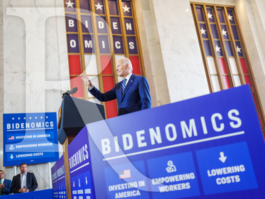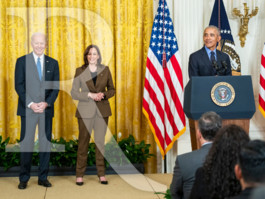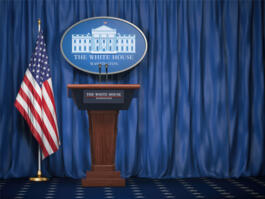The Honeymoon Begins
A Commentary by Larry J. Sabato
Almost every American recognizes January 20, 2009 as a red-letter date in U.S. history. No one who witnessed the swearing-in of President Barack Obama will ever forget it, and rarely has so much emotion been wrapped up in an inauguration. The good feelings that have been generated cannot hurt at a time when the country faces a deep recession and other significant challenges.
The uplifting part is over. The heavy lifting begins. We have been asked many questions about Obama's upcoming year, so let's try and answer several central ones in this essay.
How long will Obama's honeymoon last?
Every President gets one, but sometimes it's over before he takes office. The shortest honeymoon in modern times was for Bill Clinton. His transition was something of a disorganized mess; he indicated he was going to lift the ban on gays in the military without adequate preparation of the general public and the military; a couple of his nominees for Attorney General were non-starters; and so on. His electoral base of 43% was flimsy to begin with. After the disputed, overtime election of 2000, George W. Bush wasn't in much better shape. Losing the popular vote, having a truncated transition, and witnessing the switch of the Senate to Democratic control (when U.S. Sen. Jim Jeffords of Vermont left the GOP caucus) didn't help matters.
On the other hand, some Presidents have managed to secure lengthy honeymoons. One could argue that Franklin Roosevelt's lasted for five years. Dwight Eisenhower's was not as broad or deep as FDR's, but he was consistently popular with the exception of 1958, due to a poor economy and some administrative corruption. Lyndon Johnson had two full years of bliss. Angst over John Kennedy's assassination made 1964 legislatively golden for LBJ, and then his November 1964 landslide renewed the honeymoon for a second full year. Without Vietnam, it could have lasted far longer.
Other Presidents were not as lucky, though they were better off than Clinton and Dubya. Shallow honeymoons for Richard Nixon (another 43% winner) and George H.W. Bush, hobbled by heavy Democratic control of Congress, gave them maneuverability in foreign policy but not so much domestically. Bush Senior created his own honeymoon after the Persian Gulf War in 1991--but it had dissipated long before he was sent packing in 1992. John F. Kennedy was personally popular, especially after the disastrous Bay of Pigs invasion of Cuba in May 1961 (ironically), but he also had a tiny electoral mandate and a Congress more conservative than he was. Harry Truman was fantastically popular in the wake of FDR's death and, again, after he brought Japan to its knees with nuclear bombs in August 1945. Yet the end of World War II led to severe economic dislocation, and Truman's honeymoon was over about ten months after he succeeded to office. Nice-guy Gerald Ford was so well liked in contrast to the imperial, corrupt Nixon--Ford toasted his own English muffins, after all--that the 38th President seemed headed to an elective term of his own. Then, a month into office, Ford pardoned Nixon, and fell from the 70s to the mid-40s in the Gallup Poll overnight. Jimmy Carter rode a wave of public hope for better times, and sent the right signals for about a year, but nothing much seemed to happen. Ronald Reagan started his Presidency in surprisingly weak shape (mid-50s in the polls), but his brave behavior after a March 1981 assassination attempt propelled him to great heights and got his economic tax-cut package passed.
Notice that there aren't consistent honeymoon patterns, and real events--good and bad--interceded for many Presidents. Every Presidency is different.
Our guess is that Obama will be one of the luckier chief executives. Obama's comfortable 53% victory, the massive dose of positive publicity he has received because of the historic nature of his ascendancy, and an extraordinarily good transition has combined with Americans' yearning for a return to economic prosperity. All this has pushed Obama into the 60s and 70s in the polls, far beyond his margin of victory. Obama is fortunate in one other way: He is succeeding an especially disliked President in George W. Bush. This same "thank God he's gone" phenomenon benefited Ike after Truman, and Ford after Nixon. Despite a delayed ignition, it also helped Reagan following Carter.
Still, events are in the saddle, and they will determine whether Obama's honeymoon is six months, a year, or two. Likely passage of an all-in-one stimulus plan in the next six weeks will boost Obama. Should it be unexpectedly derailed--and we doubt it--such a setback would raise competency questions. Foreign crises can have unexpected results (see Truman, JFK, Reagan, and both Bushes). Naturally, the key element will be the patience of the American people concerning economic recovery. No President, even with the strong support of Congress and the American people, could do much to remove the financial wreckage quickly. Expectations for Barack Obama are much too high, and they are the real foe of his prolonged honeymoon, not the Republicans.
How will Obama's first 100 days stack up?
FDR's curse on other Presidents is alive and well. Mark April 29th down on your calendar. Every news organization in America will write or air stories by that date about Obama's progress. Roosevelt's early blizzard of successful programs, legislation, and executive orders will likely never be equaled. But it is also true that the '100 days' yardstick is unfair and stupid, since haste can make waste, and many situations call for careful planning rather than immediate action. Nonetheless, only Harry Truman (thanks to World War II) and LBJ (who owed it mainly to national guilt and mourning) are second-tier rivals to FDR in the 100-day category. An argument for Reagan can also be made in this classification.
Don't count Obama out here. Again, conditions are not dire enough to produce an FDR effect. But they are bad, and Obama has large Democratic majorities in Congress--plus talent and energy enough for several men. The stimulus plan may approach a trillion dollars--so massive it will contain more additional spending and programs than most Presidents pass in a whole term. This President appears determined to go even further, pushing for health care reform, entitlement restructuring, sweeping energy policy changes, and more. Obama won't get it all, and much of it won't come as easily as he hopes. Yet 2009 might prove to be another highly productive period for government. We'll leave to individual readers the judgment about whether that is good or bad.
Will the news media's love affair with Obama continue?
Hey, we deserve to get one easy question. For the most part, the answer is no. The press will revert to adversarial form. Between the media and a politician, there is only an infatuation, never a good marriage. And over time, even lingering friendship becomes fair-weather.
Press critics might say that a large portion of the elite media, undeniably liberal and Democratic in their voting habits, have already achieved their objective--an Obama Presidency. Now that the Democrat is safely ensconced in the White House, they can comfortably resume the attack, nitpicking with abandon, exaggerating every bump in the road, and cynically questioning motives. Every news organization is different, and most honest readers and viewers know which ones were in the tank for Obama and which ones preferred John McCain. In 2008 Obama boosters in the press corps greatly outnumbered the McCain backers.
Obama has been frequently compared with Lincoln and FDR. The President's staff has encouraged it, and the press has gone along for the ride--sometimes driving the car. But maybe the better analogy is to John F. Kennedy. Reporters swooned for JFK much as they have for Obama. Like JFK, Obama has been shrewd in cultivating them, giving them face time, flattering them. That's quite enough to buy a lot of favorable coverage in a trade populated at the top by massive egos. Some of the big media stars give the impression of imagining themselves as the President's peers. Back in the early 1960s, both in the campaign and during the administration that followed, many top reporters relished Kennedy's attentions, saw themselves as informal advisers, and shamefully covered up for the President's reckless extramarital affairs. That era is long gone, and the mainstream media have no monopoly on coverage today. Some TV news celebrities and top print reporters still exhibit the same human frailties as their 1960s brethren, but there are whistleblowers aplenty in the ranks of the working press and on the partisan blogs.
Many other queries about Obama's first year spring to mind. What unexpected domestic and foreign policy crises will rudely interrupt the flow of the Obama administration? How will the Republican party adapt to its back-row seat in government? Which GOP officials in Washington and out in the states will emerge to carry the banner of the loyal opposition? Which Obama Cabinet members and other appointees will shine brightly, and which will dim or even flame out? How about the dozens of Obama campaign promises--which will be put on hold or jettisoned? Will Obama win or lose his first electoral tests in the upcoming gubernatorial contests in New Jersey and Virginia?
The Crystal Ball will address them all in time. The answers remain elusive, but the past usually gives clues to the future. In 2009 there will be legislative victories to celebrate, defeats to mourn, corruption to decry. Presidential enemies will attack with effect, friends will embarrass him with still greater effect. Such is the nature of power and governing, occurrences as certain as blizzards in February, heat waves in July, and a generous helping of hurricanes, tornadoes, forest fires, and mudslides along the way.
Larry J. Sabato is the director of the Center for Politics at the University of Virginia.
See Other Commentary by Larry Sabato
See Other Political Commentary
Rasmussen Reports is a media company specializing in the collection, publication and distribution of public opinion information.
We conduct public opinion polls on a variety of topics to inform our audience on events in the news and other topics of interest. To ensure editorial control and independence, we pay for the polls ourselves and generate revenue through the sale of subscriptions, sponsorships, and advertising. Nightly polling on politics, business and lifestyle topics provides the content to update the Rasmussen Reports web site many times each day. If it's in the news, it's in our polls. Additionally, the data drives a daily update newsletter and various media outlets across the country.
Some information, including the Rasmussen Reports daily Presidential Tracking Poll and commentaries are available for free to the general public. Subscriptions are available for $4.95 a month or 34.95 a year that provide subscribers with exclusive access to more than 20 stories per week on upcoming elections, consumer confidence, and issues that affect us all. For those who are really into the numbers, Platinum Members can review demographic crosstabs and a full history of our data.
To learn more about our methodology, click here.



